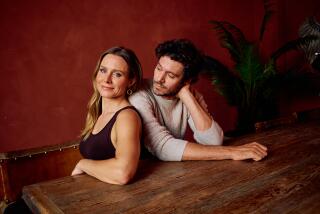Q&A; : Butler’s Out to Reorient the Take on Gay, Straight Roles : The actor talks about the double standard in casting heterosexuals as homosexuals, and vice versa.
- Share via
Audiences at Dan Butler’s autobiographically inspired one-man play, “The Only Thing Worse You Could Have Told Me,” which has been running at Hollywood’s Theatre Geo since last spring, leave knowing that the veteran actor is gay. It’s what the play is about.
Many more people know him, however, for his role as “straight” sportscaster Bob (Bulldog) Briscoe on NBC’s Emmy Award-winning “Frasier.” We caught up with Butler, 39, at a Melrose eatery to ask why he accepted such a controversial part.
*
Question: In deciding whether to accept this straight role, did you consider its possible negative consequences on your career?
*
Answer: My agent privately warned me that this could be a career-terminating move. But after I decided to go with it, he’s supported me in full. I hope that my public will too. And I hope I’ll still be seen for gay roles.
Q: So you don’t think people might mistake you for Bulldog and wonder whether you’re really straight?
A: I’d like to think that people would not be so narrow-minded as to hold this against me. Besides, some of my best friends are straight! I also want to mention here that I continue to have a very loving and wonderful relationship with my boyfriend.
Q: But with women and blacks and Latinos and gays and lesbians going after them, why would you want to identify with such a besieged minority as straight white males?
A: As Rodney King said after the riots, we all live here together. We’ve got to get along. I don’t want to pat myself up on the back, but someone’s got to stand up for them!
Q: How did you study for the part?
A: There was a time in my teens that I actually slept with women. It was just an awkward phase I was passing through. But I thought back to that phase, and played off it. I also did some research at a couple of straight bars. By the end of the evening, one woman gave me her number, so I think I was pretty successful.
Q: We’re surprised that you’re admitting, for publication, that you’ve actually had some heterosexual experiences.
A: Why not? I’m not big on the closet. And I’d like to add that if you’re straight, you should be proud! That’s who you are! You were born that way! Besides, I have a sister who’s straight. And I want her to know that I love her and support her.
Q: Did any of your straight friends give you advice on how to play the part more authentically?
A: Sure, but I don’t want to mention their names, out of respect for their privacy. I did, however, have two very special high school teachers. One was in shop class, where he taught me to use Makita power tools. The other was my intramural basketball teacher, who taught me hook shots.
Q: What kind of preparations did you make to play the role? Did you buy any special colognes or clothing?
A: Mostly, I watched Tommy Lasorda on TV. And I learned that the key to playing a straight white male is to wear pants that allow for an expanding waistline. I don’t hold that against them, though.
Q: What’s the hardest jump to make in playing straight?
A: The way they’re always talking about sex. Do you notice how often they talk about their wives and girlfriends? Everything they say seems to have a sexual innuendo. I think that being straight is a personal affair. I don’t mind what they do behind closed doors; I just get uncomfortable when they kiss and hold hands so openly in public.
Q: Is your playing Bulldog a way of saying straight white men should be treated equal to other minorities?
A: Absolutely! And they’re not. Sometimes--when you watch sporting events, for example--all you see are the rowdy, drunken, obnoxious straights. But they’re only part of the crowd. The reality is that there are many other well-behaved straights there. That’s a point I want to make in my portrayal of Bulldog. I want him to be the embodiment of the silent majority of straight white men, with a soft, Hallmark card touch to him.
Q: What does your boyfriend think of all this activism?
A: He’s very understanding.
Q: Hasn’t he started wondering whether you might be a latent heterosexual?
A: I have to admit: Women are sexy. I could see how someone could get into it and be a happy white heterosexual. Not me, of course; but for others--hey, why not?
More to Read
The biggest entertainment stories
Get our big stories about Hollywood, film, television, music, arts, culture and more right in your inbox as soon as they publish.
You may occasionally receive promotional content from the Los Angeles Times.










